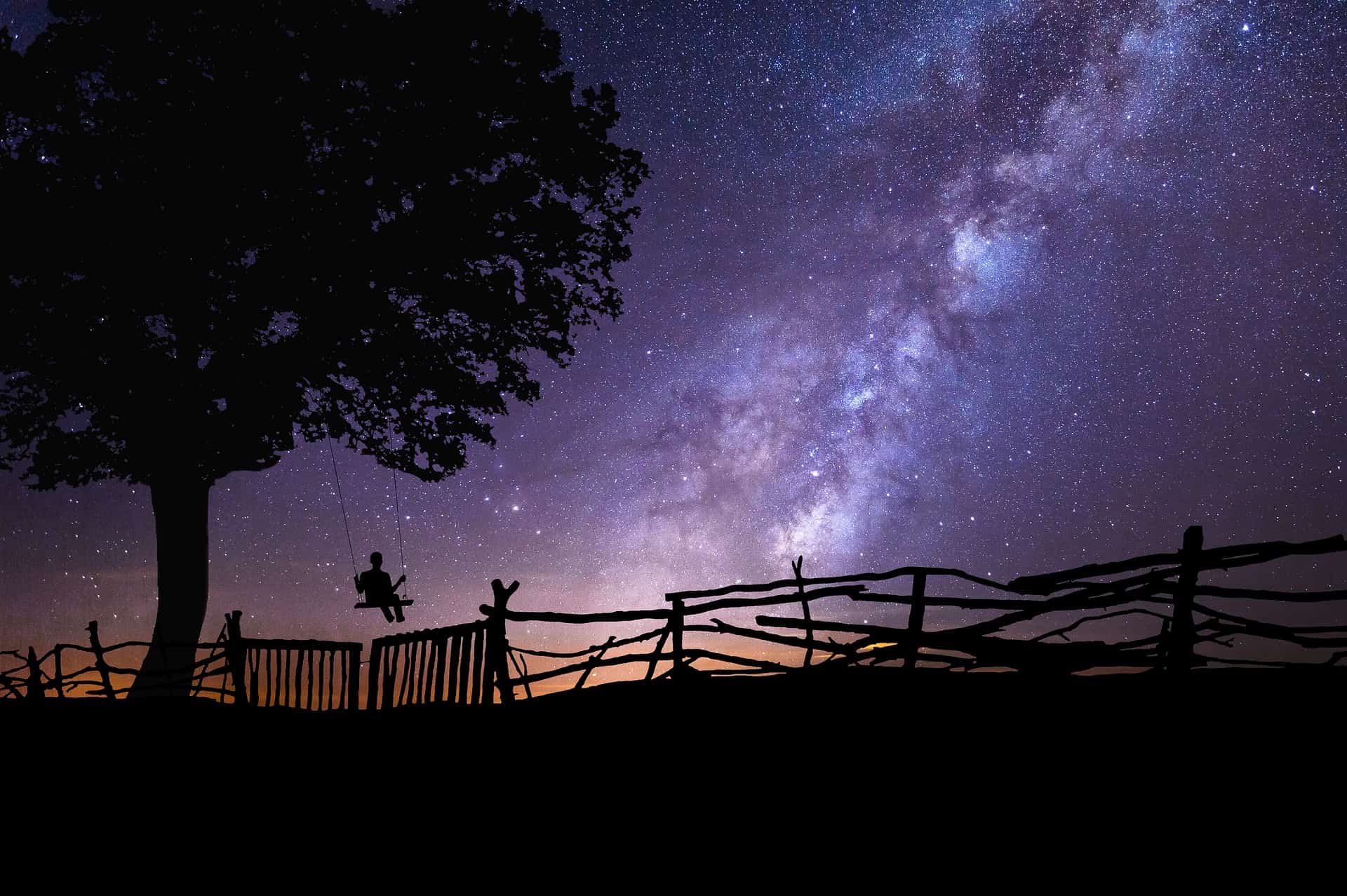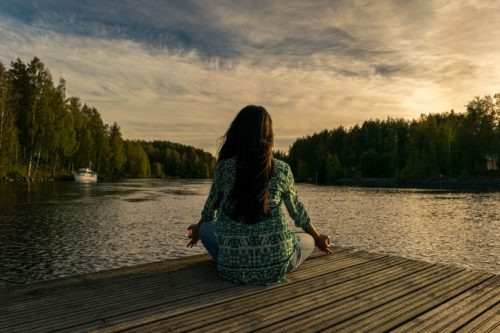Why should yogis pay attention to science? Here’s my personal account.
I am a long time yogini and meditator. I am also a social scientist. However, science and spirituality became one for me only recently.
In my work as a researcher, I have been fascinated with impact evaluations. Working on development programs overseas, I learned that impact research can help us find better ways to alleviate poverty.
Unfortunately, many practitioners in this field don’t like impact evaluations. “We know better based on our experience” they might say. Or if their own program is being evaluated they might fear that the results are not as positive as they expected. This might undermine their conviction or strip away future funding for the program.

Night sky as a symbol of the intersection of science and spirituality.
“My researcher self and my spiritual self were two different personalities.“
When starting both yoga and meditation over a decade ago, I felt the effects right away. “Did you get a new haircut?” my boyfriend asked when I came home from my first yoga class. Whenever I asked teachers why exactly the practice made me feel so good I received many different answers. Too many answers.
Every single answer in itself made sense somehow – like the activation of the lymphatic system in inversions or the soothing effect of chants. However, I didn’t have a clear sense of the underlying logic or science. I didn’t feel that I really understood what was going on. I fell into the belief that spiritual practice cannot be examined with critical thinking. Even more, that it shouldn’t. That it derives its magic from not understanding. From surrendering.
Hence, my researcher self and my spiritual self were two different personalities awkwardly sharing the same body. I carefully hid my spiritual side at work or at least disguised it in socially acceptable narratives. I labeled a ten day silent buddhist retreat as a yoga and detox vacation. In the spiritual realm, I tried not to say what I was doing for work. I wanted to be seen as what I felt – a true seeker.
Then life conspired and my two personalities started to become one: I went through a life crisis and my long vipassana meditation practice “failed” me. I only learned later that tackling a full blown breakdown with mindfulness was not the best idea. Lucky me, I had access to a senior teacher.
He recommended to practice only loving kindness and self compassion for a while before returning to insight practices. His one minute advice would change my practice and my life. But I couldn’t help but wonder what would have happened if I hadn’t have a very experienced teacher on my side.
“Everyone today can meditate on the go but getting deeper into meditation is hard.“
At the same time, I started wondering about how little information is out there on deeper meditative tools and experiences. They seem to be carefully guarded by spiritual traditions. Finding the right approach during crisis but also finding ways to train e.g. concentration more effectively for me felt like an excruciatingly long and difficult trial and error process. While I understood some reasons for not sharing ‘advanced’ techniques with a broad audience (which would be another article in and of itself), there must be more general guidance out there, I thought.
While everyone nowadays can meditate on the go via Headspace and Calm, getting deeper into meditation without signing up for a spiritual tradition, without finding a teacher, is close to impossible.

“Understanding the science behind meditation, such as the concept of neuroplasticity, deepened my practice!“
That’s when I stumbled upon the science of spiritual practice, the (neuro-) science to be exact. I met Rick Hanson, psychologist, meditation teacher and New York Times bestselling author (e.g. Hardwiring Happiness) at a daylong at Spirit Rock. From the start, I was mesmerized by his (neuro-) scientific accounts of the human condition and why and how meditation can be so powerful. He taught me how to build a happier brain through meditation.
I think it was through his work that I finally learned how to really trust in the practice. I learned how to be aware of my nervous system and how to self-regulate. I started to understand the effects of meditation and spiritual practice in a new systematic and empowering way. What I didn’t expect was that this understanding catapulted my spiritual practice onto the next plane as well.
By understanding concepts like positive neuroplasticity (you can change your brain!), I fully started to trust the practices, spend more time practicing and felt empowered to adjust my own practice if needed.
I am not suggesting that neuroscience is the only or the most reliable sign post to spiritual progress (the concept of progress in and of itself is suspect in most traditions). If you have a spiritual practice that makes you feel connected, compassionate and content, good for you. Stick to it. Don’t bother about research (though you might still learn something interesting!).
Finding Guidance in the ‘Post-Lineage’ Time!
The beginning of my spiritual practice was filled with confusion. Some of the confusion was the ‘normal’ confusion and doubt of any spiritual path. Some of the confusion however felt unnecessary.
More transparency and clarity about meditative ‘tools’ and their effects would help practitioners to develop an empowering, nourishing and longterm practice. In yoga, our era today is sometimes called the “post-lineage time”, where students don’t have access to senior teachers and spiritual communities anymore. However, students might still have spiritual experiences (just google “kundalini awakening”) but without the context to make sense of it.

I am all for more transparency and for giving people a better idea of what a spiritual path might look like…or, how to create deep self-awareness, insight into their own experience and ways how to self regulate. Especially for the more skeptical seekers or for people without access to spiritual communities – scientific research of spiritual practices can be a tremendous opportunity for learning and orientation.
This article is kicking off a series of articles which will explore some of the recent (neuro-) scientific research and how it can inform spiritual practice.

I am always struggling with the question “So, what do you do?”. I have used many labels in the last decade – philosopher, economist, writer, researcher, contemplative, yogi, seeker, world traveler.
My professional career has been largely in economic development trying to make living conditions better for the poor. My vision is a world which is more equal, more just, healthier and happier for everyone – not only a select few.
However, through my own path in Theravada Buddhism and yoga, I learned that a big part of journey towards contentment takes place within. So I started teaching yoga and immersing myself into ancient wisdom. Due to my background in research, I am also closely following the emerging (neuro-)scientific insights into yoga, meditation and spirituality – trying to solve some of the contradiction between science and spirituality.
In my writing and teaching, I blend my own contemplative insights with the emerging scientific research, I add some “researchy” thoughts on bigger picture questions, ultimately hoping to inspire personal and social change.








